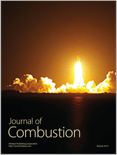
Journal of Combustion
metrics 2024
Connecting Ideas, Fueling Progress
Introduction
Journal of Combustion is a premier academic journal dedicated to the field of combustion science and technology, published by HINDAWI LTD. With an ISSN of 2090-1968 and an E-ISSN of 2090-1976, the journal has been an open-access platform since 2008, ensuring that cutting-edge research is accessible to all. Based in the United States at Adam House, 3rd Flr, 1 Fitzroy Sq, London W1T 5HF, England, the journal publishes articles spanning various relevant disciplines, contributing to knowledge in Chemical Engineering, Fuel Technology, and Energy Engineering. As of 2023, it ranks in the Q3 quartile in Chemical Engineering (miscellaneous) and Fuel Technology, and in Q4 in Condensed Matter Physics and Energy Engineering and Power Technology, highlighting its growing impact and relevance in these fields. Researchers will find valuable insights as the journal converges its findings from 2010 to 2024. With a focus on promoting innovative approaches and exploring new frontiers in combustion research, the Journal of Combustion continues to be an essential resource for academics, professionals, and students committed to advancing the understanding and application of combustion processes.
Metrics 2024
 0.21
0.21 1.50
1.50 1.20
1.20 24
24Metrics History
Rank 2024
Scopus
IF (Web Of Science)
JCI (Web Of Science)
Quartile History
Similar Journals

INTERNATIONAL JOURNAL OF AUTOMOTIVE TECHNOLOGY
Driving Innovation in Automotive EngineeringINTERNATIONAL JOURNAL OF AUTOMOTIVE TECHNOLOGY, published by the Korean Society of Automotive Engineers (KSAE), stands as a key platform in the field of Automotive Engineering since its inception in 2000. With an ISSN of 1229-9138 and an E-ISSN of 1976-3832, this esteemed journal aims to disseminate cutting-edge research, innovative methodologies, and advancements in automotive technology. As of 2023, it holds a distinguished Q2 quartile ranking in the Automotive Engineering category on Scopus, featuring a competitive rank of 48/125, illustrating its recognition among peers and the academic community. The journal also enjoys a global readership despite its base in South Korea. Researchers, professionals, and students in the automotive sector are encouraged to contribute to this journal, thus promoting collaboration and knowledge exchange that fosters innovation and progress in automotive engineering. Additionally, the journal is committed to enhancing accessibility of knowledge across boundaries and aims to continue serving as a catalyst for academic growth up to the year 2024.
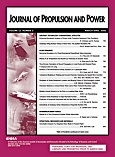
JOURNAL OF PROPULSION AND POWER
Transforming Ideas into Aerospace BreakthroughsJOURNAL OF PROPULSION AND POWER, published by the American Institute of Aeronautics and Astronautics, is a premier peer-reviewed journal dedicated to the advancement of knowledge in the fields of aerospace engineering, mechanical engineering, and fuel technology. With an impressive impact factor and ranked in the Q1 and Q2 categories for various relevant fields, the journal serves as a vital resource for researchers, professionals, and students alike who are looking to stay abreast of the latest innovations and breakthroughs in propulsion systems and power generation methodologies. Established in 1985, the journal covers a wide range of topics, ensuring a comprehensive understanding of propulsion technologies from atmospheric to space applications. Its robust Scopus rankings highlight its significance in the academic community, establishing it as a leading forum for sharing pivotal research findings and fostering collaborative dialogues that drive the aerospace industry forward. Located in Reston, Virginia, the journal does not currently offer open access options, yet it remains accessible to a vast audience via academic institutions and libraries. As we move further into the 21st century, the JOURNAL OF PROPULSION AND POWER continues to be an indispensable tool for the exploration and evolution of propulsion and power systems.
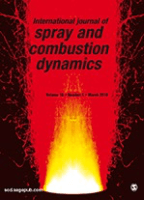
International Journal of Spray and Combustion Dynamics
Igniting Knowledge in Automotive and Energy EngineeringWelcome to the International Journal of Spray and Combustion Dynamics, a premier publication dedicated to advancing the understanding of spray and combustion phenomena in various applications. Published by SAGE Publications Inc, this journal serves as a vital resource for researchers and professionals in the fields of Automotive Engineering, Energy Engineering, and Physics, boasting a commendable Q2 ranking in its categories for 2023. With an ISSN of 1756-8277 and E-ISSN 1756-8285, it engages a global audience in the investigation of innovative solutions to energy efficiency and combustion processes. Operating from the United Kingdom, this journal is a key player in disseminating high-quality research findings from 2011 to 2024, making it a go-to source for those seeking to enhance their knowledge and contribute to cutting-edge developments in these dynamic areas of study. Researchers, practitioners, and students alike will find this journal invaluable for staying informed and connected to the latest advancements in spray and combustion dynamics.
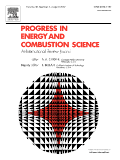
PROGRESS IN ENERGY AND COMBUSTION SCIENCE
Driving progress in energy and fuel technology.PROGRESS IN ENERGY AND COMBUSTION SCIENCE, published by PERGAMON-ELSEVIER SCIENCE LTD, stands as a premier journal in the realms of energy engineering and fuel technology, with an impressive impact factor and recognition across multiple scientific disciplinary matrices. Since its inception in 1975 and continuing through 2024, this esteemed publication has contributed significantly to the advancement of knowledge in energy resources, combustion processes, and their applications in modern technology. With a robust ranking of Q1 in key categories such as Chemical Engineering, Energy Engineering and Power Technology, and Fuel Technology, the journal consistently showcases high-quality research that influences both academia and industry. Researchers, professionals, and students benefit from its rigorous peer-reviewed articles, which foster a deeper understanding of energy-related challenges and innovations. Although it is not an Open Access outlet, its relevance and contribution to the scientific community are undeniable, making it a vital resource for anyone engaged in the pursuit of sustainable energy solutions.
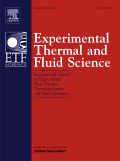
EXPERIMENTAL THERMAL AND FLUID SCIENCE
Transforming experimental insights into engineering excellence.EXPERIMENTAL THERMAL AND FLUID SCIENCE is a prestigious academic journal published by Elsevier Science Inc, dedicated to advancing the fields of thermal and fluid sciences. With a strong focus on innovative experimental research, it plays a crucial role in disseminating new knowledge and techniques across multiple domains, including Aerospace Engineering, Chemical Engineering, Fluid Flow and Transfer Processes, Mechanical Engineering, and Nuclear Engineering. Holding a notable impact factor and ranking in the Q1 quartile across these categories since 2023, the journal is recognized for its high-quality contributions, which appeal to a diverse audience of researchers, industry professionals, and students alike. Additionally, with dedicated coverage from its inception in 1988 to projections extending through 2025, EXPERIMENTAL THERMAL AND FLUID SCIENCE provides a vital platform for sharing advancements in experimental techniques and findings that shape the future of engineering and applied sciences.
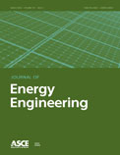
JOURNAL OF ENERGY ENGINEERING
Championing Integrity in Energy ResearchJOURNAL OF ENERGY ENGINEERING, published by the ASCE-Amer Soc Civil Engineers, serves as a pivotal resource in the fields of civil and structural engineering, energy engineering, and nuclear energy research. With an ISSN of 0733-9402 and an E-ISSN of 1943-7897, this esteemed journal demonstrates a consistent commitment to advancing knowledge in energy systems, sustainability, and waste management. Ranking within the second quartile in several categories—including Civil and Structural Engineering and Energy Engineering and Power Technology—this journal maintains a strong reputation, underscored by its Scopus rankings that place it in the top tiers of its discipline. Accessible from 1982 through 2024, the journal provides researchers and professionals meaningful insights through rigorously peer-reviewed articles, critical reviews, and case studies that address contemporary challenges in energy utilization and infrastructure development. Without open access options, it ensures the integrity and credibility of published work, showcasing influential research that contributes to sustainable solutions in energy and environmental frameworks. Researchers, professionals, and students alike will find the JOURNAL OF ENERGY ENGINEERING an indispensable platform for exploration and dissemination of innovative ideas within the realm of energy and engineering.

Applications in Energy and Combustion Science
Fueling Knowledge in Energy and Combustion ScienceWelcome to Applications in Energy and Combustion Science, a premier open-access journal published by ELSEVIER that has been at the forefront of research since 2020. With the ISSN 2666-352X, this journal is dedicated to advancing the knowledge and application of energy technologies and combustion systems, reflecting a strong commitment to the evolving demands of the field. Based in the United Kingdom and recognized for its robust contributions, it has achieved noteworthy status in the 2023 rankings: a Q1 classification in both Chemical Engineering (miscellaneous) and Fuel Technology, alongside a Q2 standing in Energy (miscellaneous). Researchers will find it a significant platform, with Scopus rankings placing it among the top tiers in various categories. This journal offers an essential resource for professionals and students aiming to stay abreast of innovative developments and applications in the critical areas of energy and combustion, ensuring broad accessibility and dissemination of research findings.

Fuels
Transforming Energy Challenges into Sustainable SolutionsFuels is a premier open-access journal published by MDPI, focusing on the multifaceted field of fuel science, technology, and applications. Since its inception in 2020, this journal (E-ISSN: 2673-3994) has rapidly become a vital resource for researchers, professionals, and students engaged in the exploration of sustainable fuel alternatives, combustion technologies, and energy conversion processes. Located in Basel, Switzerland, Fuels aims to disseminate high-quality research that not only advances academic understanding but also addresses real-world energy challenges. By embracing an open-access format, it ensures that significant findings are readily available to the global scientific community, helping to foster collaboration and innovation in the transition to cleaner energy solutions. With an emphasis on interdisciplinary research and practical applications, Fuels is poised to be a leading journal that shapes the future of energy technologies.
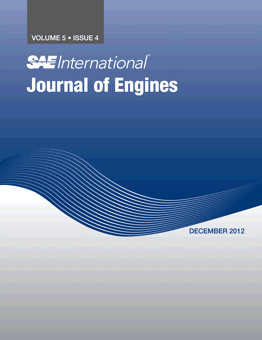
SAE International Journal of Engines
Driving Innovation in Automotive EngineeringSAE International Journal of Engines, published by SAE International, serves as a leading platform in the field of automotive engineering and fuel technology. Established in 2008, this journal has quickly gained recognition, achieving a Q2 ranking in Automotive Engineering and a Q3 ranking in Fuel Technology as of 2023. With the journal's ongoing commitment to advancing the understanding of engine technologies, it encompasses a diverse range of topics including engine performance, emissions, fuels, and innovative technologies driving the automotive industry. Researchers and professionals can benefit from the high-quality peer-reviewed articles that the journal features, while the comprehensive content serves as an invaluable resource for students engaged in automotive studies. Although it does not currently offer open access, the journal's credibility is further reinforced by its respectable Scopus rankings, indicating its significant impact within the academic community. For anyone seeking to stay at the forefront of engine research and automotive advancements, the SAE International Journal of Engines is an essential resource.

International Journal of Self-Propagating High-Temperature Synthesis
Connecting Experts in Self-Propagating Synthesis.The International Journal of Self-Propagating High-Temperature Synthesis, published by SPRINGER, serves as a pivotal platform for researchers and professionals dedicated to the field of materials science and process chemistry. With an ISSN of 1061-3862 and an E-ISSN of 1934-788X, this journal focuses on innovative approaches and advancements in self-propagating high-temperature synthesis, contributing significantly to the ongoing evolution of material development techniques. Despite its recent launch, the journal has quickly established its presence in the academic community, ranking in the Q4 category for both materials science and process chemistry and technology as of 2023. It positions itself as an essential resource for those looking to explore the intricacies of high-temperature synthesis processes and their applications. Researchers will appreciate its rigorous peer-review process and its commitment to disseminating high-quality research, even as it is currently not an open-access journal. The journal's convergence from 2011 to 2024 marks its ongoing dedication to advancing this niche area of study, making it a valuable addition to any academic reference library.